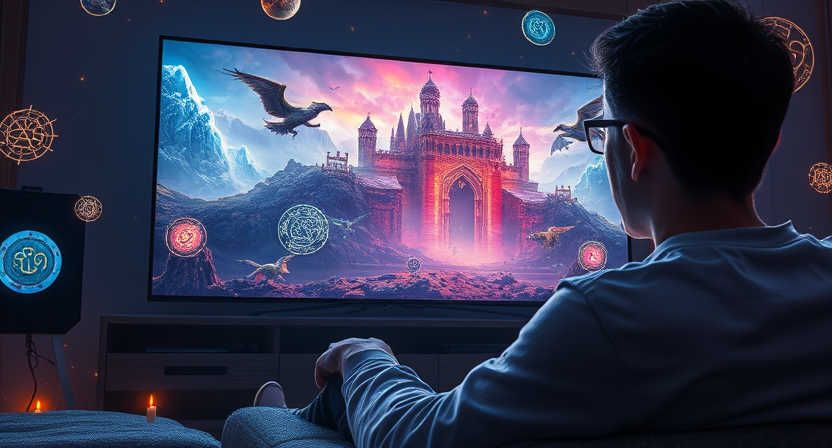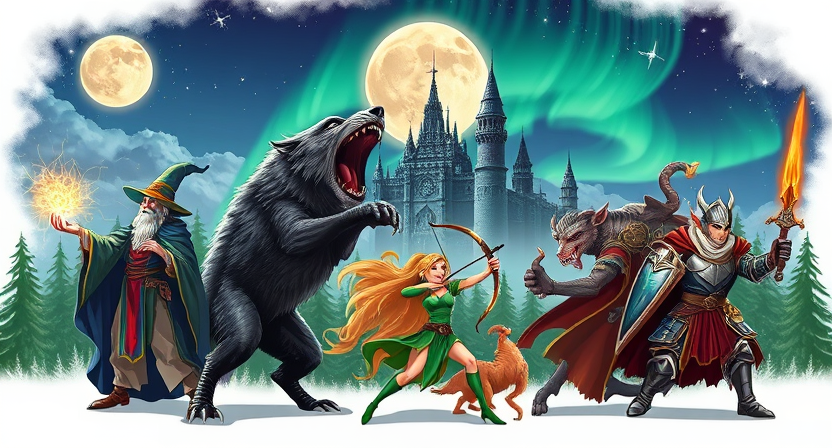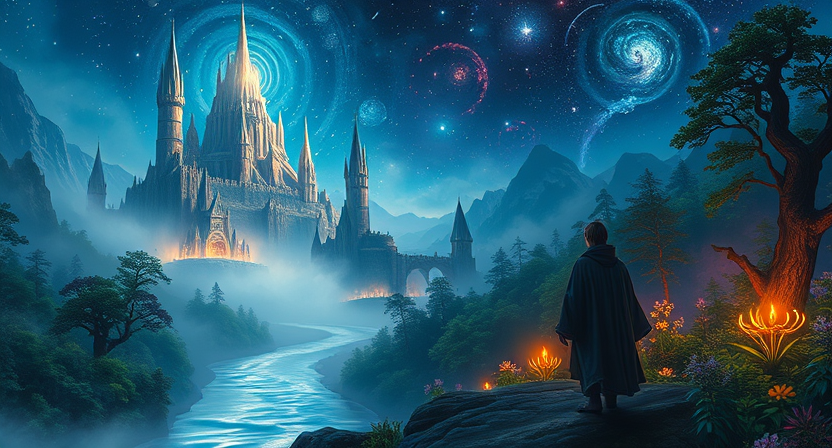The Power of Fantasy in TV Shows

Fantasy in TV shows has the remarkable ability to transport viewers to imaginative worlds beyond the constraints of reality. Through captivating storytelling and fantastical elements, these shows create a sense of wonder and excitement that captivates audiences of all ages. By immersing viewers in fantastical realms filled with mythical creatures, magical powers, and epic adventures, TV shows have the power to spark our imagination and ignite our sense of curiosity.
One of the key strengths of fantasy in TV shows is its ability to serve as a form of escapism for viewers. In a world filled with everyday challenges and stress, fantasy shows offer a much-needed break from reality, allowing viewers to temporarily escape into a realm where anything is possible. This escapism not only provides entertainment but also allows viewers to explore different emotions, themes, and moral dilemmas in a safe and engaging environment.
• Fantasy TV shows transport viewers to imaginative worlds beyond reality
• Captivating storytelling and fantastical elements create a sense of wonder and excitement
• Immersing viewers in fantastical realms with mythical creatures, magical powers, and epic adventures sparks imagination and curiosity
One of the key strengths of fantasy in TV shows is its ability to serve as a form of escapism for viewers. In a world filled with everyday challenges and stress, fantasy shows offer a much-needed break from reality, allowing viewers to temporarily escape into a realm where anything is possible. This escapism not only provides entertainment but also allows viewers to explore different emotions, themes, and moral dilemmas in a safe and engaging environment.
• Fantasy TV shows provide escapism for viewers from everyday challenges
• Allows exploration of emotions, themes, and moral dilemmas in an engaging environment
The Influence of Imagination on Storytelling

Imagination plays a pivotal role in shaping the narrative structure of storytelling. It serves as the catalyst that ignites creativity and allows for the construction of elaborate and compelling plotlines. Through the lens of imagination, storytellers can transport audiences to fantastical realms and delve into the depths of the human experience in ways that resonate on a profound level.
By harnessing the power of imagination, storytellers have the ability to push the boundaries of traditional storytelling conventions and craft narratives that are both innovative and thought-provoking. Through the infusion of imaginative elements, stories are imbued with a sense of wonder and intrigue that captivates viewers and keeps them engaged. Imagination serves as a conduit through which storytellers can create worlds that transcend the limits of reality, allowing for the exploration of complex themes and ideas in a manner that is both immersive and transformative.
• Imagination allows storytellers to create elaborate and compelling plotlines
• It helps in transporting audiences to fantastical realms
• Storytellers can delve into the depths of human experience through imagination
• Imagination pushes the boundaries of traditional storytelling conventions
• Infusion of imaginative elements captivates viewers and keeps them engaged
Exploring the Depths of Fantasy Worlds

Fantasy worlds have the ability to transport viewers to realms beyond their imagination, where the rules of reality are bent and magical possibilities abound. These fantastical settings serve as the backdrop for captivating storytelling, offering a canvas on which intricate plotlines and vibrant characters can flourish. From mystical creatures to enchanted landscapes, each element within a fantasy world is carefully crafted to draw audiences into a realm where anything is possible.
The exploration of these fantastical realms allows audiences to delve into unknown territories, expanding their minds and challenging their perceptions of the world around them. By immersing viewers in these alternate realities, fantasy TV shows have the power to evoke deep emotions and spark their curiosity, creating a sense of wonder and awe that is unique to the genre. As viewers navigate through these imaginative landscapes, they are invited to suspend their disbelief and embrace the enchanting allure of the unknown.
• Fantasy worlds transport viewers to realms beyond imagination
• Rules of reality are bent and magical possibilities abound
• Settings serve as backdrop for captivating storytelling
• Canvas for intricate plotlines and vibrant characters to flourish
The exploration of these fantastical realms allows audiences to delve into unknown territories, expanding their minds and challenging their perceptions of the world around them. By immersing viewers in these alternate realities, fantasy TV shows have the power to evoke deep emotions and spark their curiosity, creating a sense of wonder and awe that is unique to the genre. As viewers navigate through these imaginative landscapes, they are invited to suspend their disbelief and embrace the enchanting allure of the unknown.
Unraveling the Mysteries of TV Show Plotlines

TV show plotlines often serve as intricate puzzles, carefully crafted to keep viewers on the edges of their seats. The art of weaving together complex story arcs and hidden clues is a driving force behind the appeal of many television series. From subtle foreshadowing to unexpected twists, each breadcrumb left by the creators adds layers of depth to the overall narrative, enticing audiences to piece together the mysteries laid before them.
Engaging in the unraveling of TV show plotlines is akin to embarking on a thrilling adventure filled with suspense and anticipation. As viewers invest their time and emotions into decoding the enigmas set forth, they form a unique bond with the characters and storyline. The satisfaction derived from uncovering hidden secrets and connecting the dots within the plot serves as a testament to the craftsmanship of storytellers who masterfully construct these intricate webs of intrigue.
• Decoding hidden clues and unraveling complex story arcs is a thrilling adventure for viewers
• Viewers form unique bonds with characters and storyline through unraveling mysteries
• Satisfaction comes from uncovering hidden secrets and connecting the dots within the plot
The Role of Fantasy in Captivating Audiences

Fantasy plays a crucial role in captivating audiences by offering them an escape from the constraints of reality. TV shows that incorporate elements of fantasy transport viewers to imaginative worlds where anything is possible. By immersing themselves in these fantastical realms, audiences are able to disconnect from their everyday lives and embark on thrilling adventures alongside their favorite characters.
Moreover, fantasy in TV shows sparks the audience’s imagination and curiosity, keeping them hooked as they eagerly anticipate what will happen next. The element of the unknown adds a sense of excitement and unpredictability that keeps viewers on the edge of their seats. Whether it’s exploring magical lands, encountering mythical creatures, or witnessing supernatural abilities, fantasy in television programming allows audiences to tap into their sense of wonder and fascination.
• Fantasy offers audiences an escape from reality
• TV shows with fantasy elements transport viewers to imaginative worlds
• Immersing in fantastical realms allows audiences to disconnect from everyday life
• Sparks imagination and curiosity, keeping viewers hooked
• Adds excitement and unpredictability, keeping viewers on the edge of their seats
• Allows audiences to tap into their sense of wonder and fascination
Analyzing the Elements of Fantasy in TV Shows

Fantasy in TV shows is a dynamic force that captivates audiences with its ability to transport viewers to imaginative realms filled with wonder and excitement. The elements of fantasy serve as the building blocks of these fictional worlds, encompassing magical creatures, supernatural powers, and ethereal landscapes that defy the laws of reality. Through intricate world-building and fantastical storytelling, TV shows weave intricate tapestries of escapism that allow viewers to immerse themselves in alternate realities where anything is possible.
From the intricate spells of sorcery to the mythical beasts that roam enchanted forests, the elements of fantasy in TV shows evoke a sense of awe and intrigue that beckons audiences to suspend their disbelief and embrace the impossible. By incorporating fantastical elements into their narrative fabric, TV shows engage viewers on a visceral level, tapping into the universal desire for adventure, mystery, and limitless possibilities. Through a delicate balance of imagination and creativity, fantasy in TV shows continues to push the boundaries of storytelling, inviting audiences to explore uncharted territories of the mind and heart.
• The use of magical creatures such as dragons, unicorns, and elves adds a sense of wonder and enchantment to fantasy TV shows.
• Supernatural powers like telekinesis, shape-shifting, and time manipulation create a sense of awe and mystery for viewers.
• Ethereal landscapes such as floating islands, hidden realms, and mystical forests provide visually stunning backdrops for fantastical adventures.
• Intricate world-building through the creation of unique cultures, languages, and histories immerses audiences in richly detailed fictional worlds.
Connecting with Characters through Fantasy

Fantasy in TV shows serves as a powerful medium through which audiences can connect with characters on a deeper level. When characters are placed in fantastical worlds or face extraordinary circumstances, viewers are able to not only witness their journey but also empathize with the emotions, struggles, and triumphs they experience. Through the lens of fantasy, viewers are transported into a realm where the impossible becomes possible, allowing them to form a bond with characters that transcends mere entertainment.
By immersing viewers in a world of magic, supernatural beings, or futuristic settings, TV shows create a space where audiences can project themselves onto characters and forge a sense of kinship. As viewers witness characters navigating through fantastical challenges and dilemmas, they are able to see reflections of their own desires, fears, and aspirations. Whether it’s through rooting for a hero on a quest or empathizing with a complex anti-hero, the realm of fantasy provides a canvas for audiences to explore the depths of human emotions and relationships in a way that resonates with their own experiences and fantasies.
• Through fantasy, viewers can connect with characters on a deeper level
• Characters in fantastical worlds allow audiences to empathize with their emotions and struggles
• Fantasy TV shows transport viewers into a realm where the impossible becomes possible
• Viewers can project themselves onto characters and form a sense of kinship through fantasy
• Audiences see reflections of their own desires, fears, and aspirations in fantastical challenges
and dilemmas
• The realm of fantasy allows viewers to explore human emotions and relationships that resonate
with their own experiences
The Impact of Fantasy on Viewer Engagement

Fantasy has a profound impact on viewer engagement when it comes to television shows. The ability of these fantastical worlds to transport viewers to imaginative realms beyond their everyday lives sparks a sense of fascination and wonder. Viewers are drawn into these fantasy realms, eager to explore the mysteries, experience the emotions, and connect with the characters woven into these captivating narratives. The element of fantasy heightens the overall viewing experience, allowing audiences to escape from reality and immerse themselves in a world where anything is possible.
Furthermore, the allure of fantasy lies in its ability to evoke strong emotions and create deep connections with viewers. Whether it’s through relatable characters facing extraordinary challenges or fantastical settings that ignite the imagination, fantasy TV shows have the power to elicit a range of feelings from excitement and suspense to empathy and inspiration. This emotional engagement keeps viewers invested in the storylines, eagerly anticipating each twist and turn as they journey through these captivating worlds of fantasy.
• Fantasy TV shows transport viewers to imaginative realms beyond their everyday lives
• Viewers are drawn into fantasy worlds, eager to explore mysteries and connect with characters
• The element of fantasy heightens the overall viewing experience, allowing audiences to escape reality
• Fantasy evokes strong emotions and creates deep connections with viewers
• Relatable characters facing extraordinary challenges keep viewers invested in storylines
Delving into the Creative Process of Fantasy TV Shows

The creative process of developing fantasy TV shows is a meticulous journey that involves a fusion of imagination, storytelling, and strategic planning. It begins with the initial spark of an idea, often inspired by the boundaries of reality being pushed to new limits. The writers and creators behind these shows delve deep into the realms of fantasy, crafting intricate worlds, characters, and plotlines that capture the essence of escapism and wonder.
As the concept takes shape, meticulous attention is paid to every detail, from the nuances of character motivations to the intricacies of world-building. Each element is carefully constructed to immerse viewers in a fantastical experience that transcends the constraints of the everyday. The creative team navigates the delicate balance between reality and fantasy, weaving together themes, symbols, and metaphors that resonate with audiences on a profound level. Through this intricate process, fantasy TV shows have the power to transport viewers to new dimensions, sparking their imagination and leaving a lasting impact on popular culture.
• The initial spark of an idea is often inspired by pushing the boundaries of reality
• Meticulous attention is paid to every detail, from character motivations to world-building
• Themes, symbols, and metaphors are woven together to resonate with audiences on a profound level
• Fantasy TV shows have the power to transport viewers to new dimensions and leave a lasting impact on popular culture
The Art of Balancing Reality and Fantasy in Television

Balancing reality and fantasy in television is a delicate art form that requires careful consideration and skillful execution. Maintaining this equilibrium allows viewers to immerse themselves in a world that strikes a harmonious chord between the familiar and the extraordinary. This balancing act entails creating a narrative that is grounded in elements of reality while also incorporating fantastical elements that spark the imagination and transport audiences to new and captivating realms.
Successful television shows that master the art of blending reality and fantasy have the ability to resonate with viewers on a deeper level, evoking both a sense of familiarity and wonder. By weaving together believable characters and settings with fantastical elements and plotlines, these shows strike a unique balance that draws viewers in and keeps them engaged. This delicate interplay between reality and fantasy not only enhances the viewing experience but also allows for rich storytelling opportunities that leave a lasting impact on audiences.
• One key aspect of balancing reality and fantasy in television is creating relatable characters that audiences can connect with on a personal level.
• By grounding the story in realistic emotions and motivations, viewers are more likely to become emotionally invested in the characters’ journeys.
• Introducing fantastical elements such as magic, supernatural creatures, or alternate realities can add an exciting twist to the narrative without losing touch with the human experience.
• The world-building process is crucial in establishing a coherent and immersive setting that seamlessly integrates both real-world elements and fantastical aspects.
The Psychology Behind Fantasy in Entertainment

Fantasy in entertainment holds a unique psychological allure for audiences, offering a form of escapism that allows viewers to temporarily break away from the constraints of reality and immerse themselves in imaginative worlds. The appeal of fantasy lies in its ability to evoke strong emotions, trigger curiosity, and spark the imagination of individuals. By transporting viewers to magical realms, futuristic societies, or whimsical landscapes, fantasy content has the power to captivate the minds of audiences and provide a sense of wonder and excitement that is often missing in everyday life.
Moreover, the psychological impact of fantasy in entertainment is deeply rooted in its ability to challenge beliefs, expand perspectives, and stimulate creative thinking. By presenting unconventional scenarios, fantastical creatures, and extraordinary powers, fantasy narratives encourage viewers to explore the boundaries of their own imagination and consider possibilities beyond the confines of reality. This process of cognitive engagement can lead to cathartic experiences, emotional connections with characters, and a deeper understanding of human nature, all of which contribute to the enduring popularity of fantasy in the world of entertainment.
• Fantasy in entertainment offers a form of escapism for audiences
• It evokes strong emotions and sparks curiosity
• By transporting viewers to imaginative worlds, fantasy content captivates minds
• Fantasy challenges beliefs, expands perspectives, and stimulates creative thinking
• Cognitive engagement with fantasy narratives can lead to cathartic experiences
• Emotional connections with characters deepen understanding of human nature
Examining the Cultural Significance of Fantasy in TV

Fantasy in television has played a pivotal role in shaping the cultural landscape of society. It serves as a mirror reflecting societal values, beliefs, and dreams, offering an escape from reality while providing a platform to explore complex themes and issues. The infusion of fantasy elements brings depth to storytelling, allowing viewers to immerse themselves in fantastical worlds that challenge their imagination and spark conversations about the human experience.
Through the lens of fantasy, TV shows bridge the gap between reality and the supernatural, creating a shared experience that resonates with audiences from diverse backgrounds. These fantastical narratives often serve as allegories, metaphors, or symbols that address real-life struggles and triumphs, enabling viewers to connect with universal emotions and truths on a deeper level. The cultural significance of fantasy in TV lies in its ability to inspire, entertain, and provoke thought, transcending boundaries and fostering a sense of unity among viewers around the world.
• Fantasy in television serves as a mirror reflecting societal values, beliefs, and dreams
• It offers an escape from reality while exploring complex themes and issues
• The infusion of fantasy elements brings depth to storytelling
• TV shows bridge the gap between reality and the supernatural, creating a shared experience for diverse audiences
• Fantastical narratives often serve as allegories or metaphors addressing real-life struggles and triumphs
The Evolution of Fantasy in Television Programming

Fantasy in television programming has undergone a remarkable evolution over the years. From the early days of simple, episodic storylines to the complex, multi-layered narratives of today, the genre has continuously pushed the boundaries of imagination. The evolution of special effects and CGI technology has allowed creators to bring fantastical worlds to life in ways that were once unimaginable.
Moreover, the increasing popularity of adaptations of fantasy literature and graphic novels has brought a plethora of rich, intricate storytelling to the small screen. Shows like “Game of Thrones” and “The Witcher” have captured audiences with their detailed world-building and morally complex characters. This evolution in television programming has not only expanded the reach of fantasy genres but also elevated the quality of storytelling in the medium.
• The early days of fantasy television programming often featured simple, episodic storylines
• Special effects and CGI technology have allowed for the creation of visually stunning fantastical worlds
• Adaptations of fantasy literature and graphic novels have brought rich, intricate storytelling to television
• Shows like “Game of Thrones” and “The Witcher” have captured audiences with detailed world-building
• The evolution of fantasy in television has elevated the quality of storytelling in the medium
The Allure of Escapism in Fantasy TV Shows

Many audiences are drawn to fantasy TV shows for the sense of escapism they provide. Through intricate world-building, diverse characters, and engaging storylines, these shows transport viewers to a realm where the ordinary rules of everyday life no longer apply. This break from reality allows viewers to immerse themselves in fantastical scenarios, experiencing a sense of wonder and excitement that is often lacking in their own lives.
The allure of escapism in fantasy TV shows lies in the opportunity to temporarily leave behind the constraints and responsibilities of the real world. Viewers can vicariously experience adventures, magic, and epic battles from the safety of their own homes, offering a comforting retreat from the pressures and mundanity of daily existence. The imaginative landscapes and compelling narratives of fantasy shows serve as a gateway to explore new possibilities and unleash creativity, fostering a deep connection between viewers and the fantastic realms they encounter on screen.
• Fantasy TV shows provide a break from reality and allow viewers to immerse themselves in fantastical scenarios
• Viewers can experience adventures, magic, and epic battles vicariously from the comfort of their own homes
• The imaginative landscapes and compelling narratives of fantasy shows foster creativity and exploration of new possibilities
• Escapism in fantasy TV shows offers a comforting retreat from the pressures and mundanity of daily life
The Relationship Between Fantasy and Emotion in Viewers

Fantasy in television has a profound impact on viewers’ emotional experiences. By immersing audiences in imaginative worlds and compelling storylines, TV shows have the ability to evoke a wide range of emotions, from excitement and joy to fear and sadness. Through the lens of fantasy, viewers are able to connect with characters on a deeper level, empathizing with their struggles and triumphs as if they were real.
The emotional resonance of fantasy in television is rooted in its ability to tap into universal themes and human experiences. Whether it’s a fantastical adventure, a love story set in a magical realm, or a gripping tale of good versus evil, fantasy TV shows have the power to stir viewers’ emotions and provoke introspection. This emotional connection not only enhances the viewing experience but also fosters a sense of empathy and understanding, ultimately making the fantasy world feel more real and impactful to the audience.
• Fantasy television shows immerse viewers in imaginative worlds and compelling storylines
• Viewers can experience a wide range of emotions such as excitement, joy, fear, and sadness
• Through fantasy, viewers connect with characters on a deeper level and empathize with their struggles and triumphs as if they were real
• Fantasy taps into universal themes and human experiences to stir emotions and provoke introspection
• Emotional connection enhances the viewing experience and fosters empathy and understanding
• The fantasy world feels more real and impactful to the audience due to emotional resonance
The Power of Suspense and Surprise in Fantasy TV

Suspense and surprise are fundamental elements that contribute to the allure of fantasy TV shows. The anticipation of what will happen next keeps viewers on the edge of their seats, constantly guessing and theorizing about the unfolding plot twists. By strategically incorporating moments of suspense and surprise, show creators are able to maintain audience engagement and keep them coming back for more. These elements create a sense of excitement and unpredictability, making each episode a thrilling experience for viewers.
In the world of fantasy TV, suspense is often built through intricate plot developments and unexpected character arcs. Whether it’s a sudden betrayal, a shocking revelation, or a cliffhanger ending, these suspenseful moments enhance the overall viewing experience and leave audiences eager to see how the story will unfold. The element of surprise, on the other hand, adds an unpredictable twist that defies audience expectations and keeps them invested in the narrative. In a genre where anything is possible, the power of suspense and surprise lies in its ability to captivate and enthrall viewers, making fantasy TV shows a captivating form of entertainment.
• Suspense and surprise are fundamental elements in fantasy TV shows
• Anticipation of what will happen next keeps viewers engaged
• Show creators strategically incorporate moments of suspense and surprise to maintain audience engagement
• Intricate plot developments and unexpected character arcs build suspense
• Surprise adds an unpredictable twist that defies audience expectations
• The power of suspense and surprise captivates viewers, making fantasy TV shows thrilling entertainment
The Influence of Fantasy on Popular Culture

Fantasy has become a driving force in shaping the landscape of popular culture, permeating various forms of entertainment such as television shows. The impact of fantasy on popular culture can be seen in the way it captures the imaginations of audiences and fosters a sense of wonder and escapism. From epic battles between mystical creatures to enchanting worlds beyond reality, fantasy has the ability to transport viewers to realms far beyond the constraints of everyday life, allowing them to immerse themselves in captivating narratives that ignite their sense of awe and curiosity.
As fantasy continues to weave its magic on popular culture, it not only entertains but also influences societal norms and beliefs. Through the lens of fantastical elements, TV shows can explore complex themes and issues in a metaphorical way, offering a different perspective that resonates with viewers on a deeper emotional level. By tapping into the realm of fantasy, television programs can spark conversations, provoke introspection, and inspire viewers to contemplate the significance of imagination and creativity in shaping our societal values and perceptions.
• Fantasy captures the imaginations of audiences and fosters a sense of wonder and escapism
• Epic battles between mystical creatures and enchanting worlds transport viewers to realms beyond reality
• Fantasy influences societal norms and beliefs through TV shows
• Television programs explore complex themes in a metaphorical way, offering different perspectives that resonate emotionally with viewers
• Fantasy sparks conversations, provokes introspection, and inspires contemplation on the significance of imagination in shaping societal values
The Symbolism and Metaphor of Fantasy in TV

Fantasy in TV shows often serves as a rich tapestry of symbolism and metaphor, weaving intricate layers of meaning into the narrative. Through fantastical elements such as magical realms, mythical creatures, and supernatural powers, creators can cleverly convey deeper messages and explore complex themes. The use of symbolism allows viewers to interpret the story on a symbolic level, connecting with the characters and plot in a more profound and personal way.
Metaphors in fantasy TV shows also play a crucial role in enhancing storytelling by drawing parallels between the fantastical elements and real-life issues or emotions. By using metaphors, creators can address sensitive topics or convey universal truths in a more subtle and imaginative manner. Viewers are often drawn to the depth and complexity that metaphors bring to a storyline, allowing them to engage with the narrative on multiple levels and sparking thought-provoking discussions.
• Fantasy in TV shows serves as a rich tapestry of symbolism and metaphor
• Magical realms, mythical creatures, and supernatural powers add layers of meaning to the narrative
• Symbolism allows viewers to connect with characters and plot on a deeper level
• Metaphors draw parallels between fantastical elements and real-life issues or emotions
• Creators can address sensitive topics or convey universal truths in a subtle and imaginative manner through metaphors
• Viewers are drawn to the depth and complexity that metaphors bring to a storyline
The Intersection of Fantasy and Reality in Television

Television continues to be a powerful medium that blurs the lines between fantasy and reality, captivating audiences with its ability to transport viewers into imaginative worlds that challenge the boundaries of what is possible. The intersection of fantasy and reality in television allows creators to delve into themes that resonate with viewers on a deeper level, sparking thought-provoking discussions and evoking emotional responses.
By infusing elements of fantasy into storylines grounded in reality, television shows can explore complex issues in a way that engages viewers and prompts them to question the world around them. This creative blend of fantasy and reality not only entertains audiences but also serves as a mirror reflecting society’s values, beliefs, and struggles. As viewers immerse themselves in these captivating narratives, they are drawn into a realm where the fantastical meets the familiar, offering a unique perspective on the human experience.
• Through the use of fantastical elements, television shows can address real-world issues such as social injustice, discrimination, and political unrest
• The juxtaposition of fantasy and reality allows for allegorical storytelling that encourages viewers to think critically about their own lives and the world they live in
• By presenting familiar themes in a new light, television shows can spark empathy and understanding among audiences from diverse backgrounds
• The intersection of fantasy and reality in television provides a platform for creators to push boundaries, challenge norms, and inspire change within society.
The Future of Fantasy in the Entertainment Industry

Fantasy has continually proven to be a driving force in the entertainment industry, captivating audiences with its ability to transport them to imaginative realms and stir their emotions. As technology advances and production capabilities grow, the future of fantasy in television holds promising prospects. With the development of cutting-edge visual effects and virtual reality experiences, viewers can expect even more immersive and visually stunning fantasy worlds to come to life on their screens.
Furthermore, the fusion of fantasy elements with diverse genres and storytelling techniques paves the way for innovative narratives that push the boundaries of traditional television. As streaming platforms continue to rise in popularity, there is an increasing demand for unique and engaging content, offering creators the opportunity to experiment with new ideas and deliver fresh perspectives on the intersection of fantasy and reality. Consequently, the future of fantasy in the entertainment industry looks to be a dynamic landscape ripe with possibilities for both creators and audiences alike.
• The development of cutting-edge visual effects and virtual reality experiences
• Fusion of fantasy elements with diverse genres and storytelling techniques
• Increasing demand for unique and engaging content on streaming platforms
• Opportunities for creators to experiment with new ideas and fresh perspectives
• Dynamic landscape ripe with possibilities for both creators and audiences




